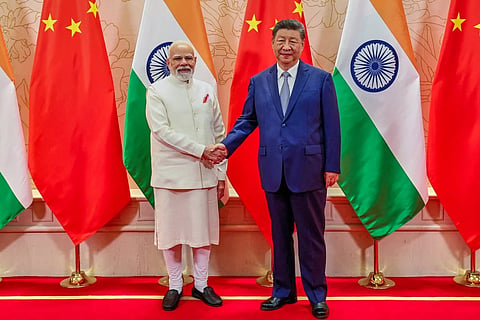

Chinese President Xi Jinping and Prime Minister Narendra Modi met on the sidelines of the Shanghai Cooperation Organisation (SCO) summit in the port city of Tianjin — Modi’s first visit to China in seven years.
Xi told Modi that China and India should be “partners, not rivals”, while Modi said there was now an “atmosphere of peace and stability” between the two countries. Modi also announced that flights between India and China — suspended since deadly clashes on their Himalayan border in 2020 — would resume, though he gave no timeline.
The meeting comes as US–India ties face new strains. President Donald Trump has imposed steep tariffs on Indian goods in retaliation for Delhi’s continued purchase of Russian oil, while Russian President Vladimir Putin, also present at the summit, faces mounting sanctions threats over the war in Ukraine.
With both nations among the world’s most populous and fastest-growing economies, Modi’s outreach to Xi signals a potential recalibration in Asian geopolitics. Xi urged that both sides handle their ties “from a strategic height and long-term perspective”, adding that “it is the right choice for both sides to be friends”.
The SCO summit itself is largely symbolic but allows leaders to voice shared concerns over US trade actions and Western alliances. Created in 2001 by China, Russia and four Central Asian states as a counterweight to NATO, it now includes 10 member states — among them Russia, Pakistan and Iran — along with 16 dialogue partners and observers. This year’s gathering is the largest since its inception.
For Tianjin, the event has become a showpiece. Banners and billboards cover the city, lightshows dazzle nightly crowds along the riverside, and streets are frequently locked down for visiting leaders’ motorcades. Taxi services have been suspended in the downtown area, though the disruptions have not deterred large crowds from celebrating what many here see as a historic moment.
Border issues should not be the defining factor in China-India ties, Chinese President Xi Jinping told visiting Indian Prime Minister Narendra Modi on Sunday, saying the relationship required a “strategic and long-term perspective”.
Meeting on the sidelines of a Shanghai Cooperation Organisation summit in the northern Chinese city of Tianjin, Xi also told Modi the two countries could be good neighbours and play a key part in the Global South, according to state news agency Xinhua.
Both countries are working to resolve long-standing disputes and find common ground as each faces strains in its relationship with the United States. Beijing is also using the summit to showcase its leadership and strengthen solidarity with the Global South.
During the one-hour meeting, Xi called for more communication to build trust and highlighted prospects for stronger cooperation in economic and global affairs.
“We are partners rather than rivals, which can offer development opportunities for each other rather than threats,” Xi said.
“China and India are two of the most civilisational countries. We are the world’s two most populous nations and part of the Global South … It is vital to be friends, good neighbours, and for the ‘dragon’ and the ‘elephant’ to come together.”
They have agreed to continue border negotiations, swiftly resume direct flights – suspended since early 2020 – and reopen border trade at three designated crossings.
While the talks were not expected to resolve major disputes, Modi’s presence in Tianjin signalled a strategic rethink amid shifting geopolitical pressures. In his opening remarks, he said the two countries had been moving in “a positive direction” since last year.
India and China were both pursuing strategic autonomy, and their relations “should not be seen through the lens of a third country”, Modi told Xi, according to the Indian foreign ministry.
“We are committed to taking our relations forward on the basis of mutual trust, respect and sensitivity,” he said.
Nevertheless, Modi will not join Xi, Russian President Vladimir Putin and North Korean leader Kim Jong-un in Beijing on Wednesday for a military parade marking 80 years since the end of World War II.
India’s relationship with the US, and China’s close ties with Pakistan, could still temper improvements in bilateral relations. Washington has courted New Delhi for years as a counterweight to Beijing, but those efforts were undermined this year when the White House imposed 50 percent tariffs on Indian goods.
Modi’s stop in China followed talks in Japan, where he and Prime Minister Shigeru Ishiba signed an economic security initiative covering semiconductors, artificial intelligence, critical minerals, clean energy and pharmaceuticals. Tokyo also pledged $67 billion in investment in India over the next decade and agreed to transfer new Shinkansen “E10 series” high-speed train technology.